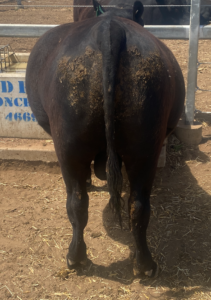Bloat in cattle
Bloat occurs when excess gas accumulates in the rumen because it cannot be belched or pass through the digestive tract.
Two forms of bloat occur:
- Frothy: Some plants can contain foaming agents that produce foam in the rumen, trapping gas.
- Free: Gas accumulates due to obstruction of the oesophagus. This may be because there is an object blocking gas escape, the rumen is flaccid, increased pressure from outside the oesophagus, and diseases affecting the nerves (such as tetanus). As a result the animal cannot belch normally.
In this article, we discuss:

Bloat occurs when eating rich diets
Bloat occurs when animals are grazing:
- wilted green forage containing prussic acid, leading to rumen paralysis and bloat.
- lush and highly digestible temperate legumes such as lucerne, medics and clover.
- high grain diets.
The natural foaming agents found in these legumes and grain diets cause foam to form in the rumen.
Symptoms
The most tell-tale symptom of bloat, is the swelling to the left upper flank. Others include:
- sudden death
- not wanting to eat
- not wanting to move
- staggering
- straining to urinate and defecate
- rapid breathing and tongue protruding
- agitation and rubbing of their sides against trees/objects.
Preventing bloat
A range of prevention methods are available in high-risk situations.
These include:
- Avoid grazing wilted green forage if possible.
- Ensure animals are not hungry before grazing a high-risk pasture. This may require feeding hay prior to grazing the pasture.
- Restrict intake of high-risk feed by limiting grazing time or access with strip grazing.
- Adding antifoaming agent to water troughs, feed, or incorporating into feed blocks.
- Spraying pastures with antifoaming agent.
Available antifoaming agents include oils/fats and synthetic non-ionic surfactants.
For more information regarding non-ionic surfactants, you should consult with your veterinarian directly, for the correct usage and dosage requirements for your scenario.
Treating impacted animals
The treatment of a bloated animal depends on the type of bloat it has.
Frothy bloat is treated with antifoaming agents, administered via a stomach tube.
Free-gas bloat is treated with the placement of a trocar and cannula or removal of the obstruction.
Early (or mild) cases of bloat can be treated with an anti-bloat preparation. To encourage the preparation to mix with the contents of the rumen, the animal should be kept moving.
Moderate cases of bloat require veterinary attention. A vet may insert a stomach tube to relieve the build up of gas, which can also be used to deliver anti-foaming agents directly into the rumen. Again, the animal should be kept moving to encourage the preparation to mix with the contents of the rumen.
Severe cases of bloat may require insertion of a trochar and cannula, high into the left flank by a veterinarian. The trochar is sharp and pierces the body and rumen of the animal, with the cannula facilitating as a drainage outlet. After the gas and foam has been expelled an anti-bloat preparation can be administered.
In emergency situations, 250-500 ml of vegetable oil or 100-200 ml of paraffin oil can be administered via a stomach tube. In some scenarios this may not be enough to remedy the bloat. A veterinarian may have to make a 10-20 cm incision on the left flank of the rumen. They will then clean and stitch the wound and administer antibiotics to prevent potential infection.